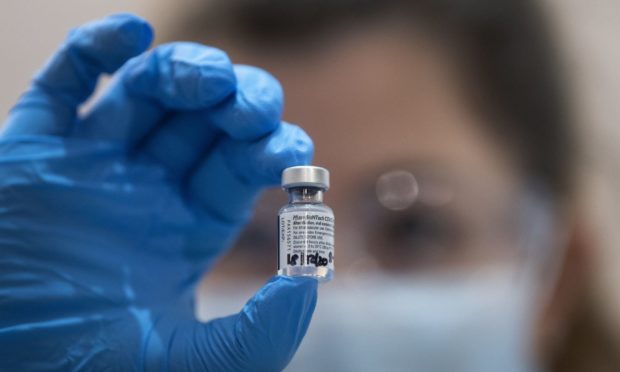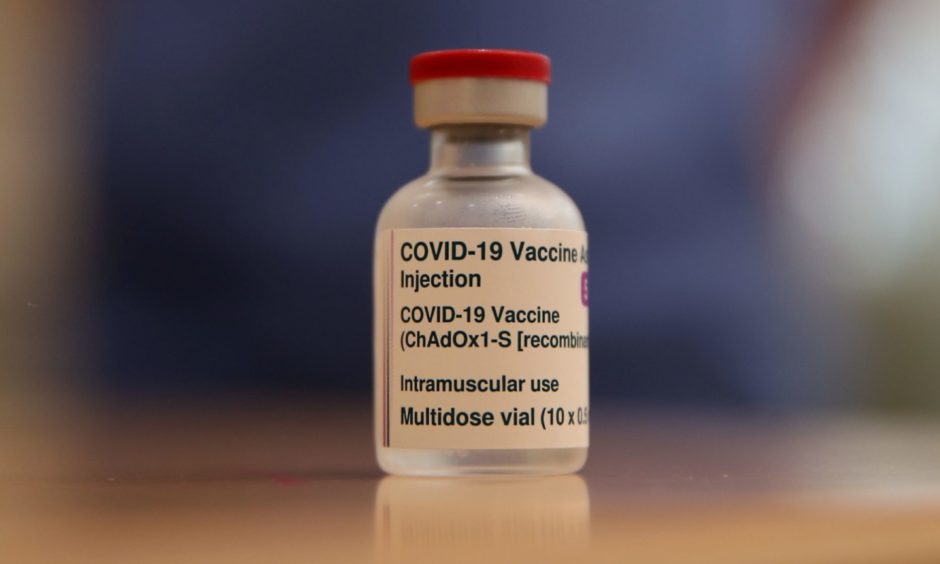Scotland’s National Clinical Director, Jason Leitch, has moved to dispel baseless claims the Covid-19 vaccine could impact fertility and urged women to seek out “trusted” information sources.
Online disinformation has spread amid the rollout of the vaccine, including unfounded concerns that the jab could affect fertility.
It comes as a recent poll revealed that young women are the most likely to turn down the Covid-19 vaccine.
Professor Leitch said it is “biologically implausible that vaccinations could cause any effect on fertility whatsoever”.
Speaking during the Scottish Government’s daily coronavirus briefing on Friday, he said: “It is not true.
“That doesn’t help us with people who get their news in different ways rather than watching this briefing or reading your newspaper.
“We have to use trusted sources as much as we can so that would be my advice to those of you with kids, relatives, friends in this age group, who are worried about this and they get their news from non-trustworthy sources, frankly.”
Professor Leitch urged women to seek out information from reputable organisations including the Royal College of Midwives and the Royal College of Paediatrics and Health.
He added: “They don’t have to just listen to the Scottish Government or what the Scottish Government advises.
“There are other, independent ways to get this same knowledge.
“I don’t want to give this kind of conspiracy theory any more credence than it frankly deserves but I do want to tackle that misinformation in a really intelligent and deep way because those who are young still need the vaccine.
“They need it for themselves but they also need it to protect their elderly relatives.”
The Find Out Now survey, which sampled 55,462 people, found that more than a quarter of 18 to 34-year-old women said they would decline the vaccination, citing concerns over its effect on fertility and pregnancies.
‘Convinced’ of vaccine safety
Health Secretary Jeane Freeman said that while she had not seen the survey, the Scottish Government took this kind of information “very seriously indeed”.
She added: “We want the overwhelming majority of adults in Scotland to take this vaccine and to come back for a second dose because we are convinced of the safety and the efficacy and the impact of it and its value in helping protect the population.
“We need to pay attention where people have hesitancies and legitimate questions they want to ask us and respond to those as frankly and as quickly as we possibly can.”
Guidance produced by the UK Government outlines that there is “no advice” to avoid getting pregnant after an individual has had a Covid-19 vaccination.
However, in its guidance the UK Government advises that, until more information is available, those who are pregnant should not routinely have this vaccine.
If a woman has had the first dose and then becomes pregnant, she should delay the second dose until after the pregnancy is over, unless she is high risk, the UK Government has advised.
Evidence from studies
The Joint Committee on Vaccination and Immunisation (JCVI) has said that the potential benefits of vaccination are particularly important for some pregnant women.
This includes those who are at very high risk of catching the infection or those with clinical conditions that put them at high risk of suffering serious complications from Covid-19.
Women in these circumstances should discuss vaccination with their doctor or nurse before making a decision.
Evidence from non-clinical studies of the Pfizer BioNTech vaccine has been received and reviewed by the Medicines and Healthcare products Regulatory Agency (MHRA).
This evidence was also reviewed by World Health Organisation (WHO) and the regulatory bodies in the USA, Canada and Europe and has raised no concerns about safety in pregnancy.
There is no data on the safety of Covid-19 vaccines in breastfeeding but it is not thought to be a risk to the breastfeeding infant.
The JCVI therefore recommends that the vaccine can be received while breastfeeding, in line with recommendations in the USA and from WHO.
‘No basis’ for any concerns
Professor Lucy Chapell, a consultant obstetrician specialising in women with medical problems in pregnancy, says it is understandable that there have been questions about the new vaccine but notes that fearful claims that can be found online have never been substantiated.
Prof Chappell, who is spokesperson for the Royal College of Obstetricians and Gynaecologists, told the PA news agency: “I dug into all those sources and I can see absolutely no basis for concerns about any of the Covid-19 vaccines that are licenced in the UK and fertility.”
She described the claims as “spurious” because they relate to similarities between some aspects of the proteins involved in fertility and the Covid-19 vaccines but these are “very speculative and entirely not supported by any of the data”.
There is neither a concern from a biological point of view nor has evidence been presented that women who have been vaccinated have gone on to have fertility problems, she said.
Pregnancy, the new virus and vaccines are “a constantly evolving area” that needs further research as there is very limited experience in trials on pregnant women, according to Prof Chappell.
She hopes that vaccine companies may change this situation in the future.
England’s Chief Medical Officer, Professor Chris Whitty, also dispelled similar claims at a UK Government briefing last month.
He said there is “no current evidence of any impact on fertility”.



